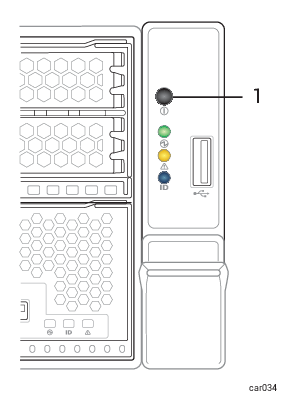System Power
ztC Endurance systems have one power button located on the control-panel ear![]() A module located at the front right of the ztC Endurance system. It houses a USB 2.0 port, power button for the ztC Endurance system, and LEDs that indicate system power status (PWR), fault conditions (ATTN), and module identification status (UID).. Press this button to start the system.
A module located at the front right of the ztC Endurance system. It houses a USB 2.0 port, power button for the ztC Endurance system, and LEDs that indicate system power status (PWR), fault conditions (ATTN), and module identification status (UID).. Press this button to start the system.
Pressing the Power Button
The system power button functions as follows, assuming both compute modules![]() A customer-replaceable unit (CRU) located at the front of the ztC Endurance system. It is equipped with processors, RDIMMs, BIOS, BMC, fans, and other technology to boot and run the ztC Endurance system. Each system contains two compute modules. are in the same state:
A customer-replaceable unit (CRU) located at the front of the ztC Endurance system. It is equipped with processors, RDIMMs, BIOS, BMC, fans, and other technology to boot and run the ztC Endurance system. Each system contains two compute modules. are in the same state:
-
If the system power is off and standby power is on, pressing the power button turns the system on and boots the operating system. See Starting Up the System.
-
If the system power is on and the operating system or BIOS
 The program a computer's microprocessor uses to start the computer system after it is powered on. It also manages data flow between the computer's operating system (OS) and attached devices, such as the hard disk, video adapter, keyboard, mouse, and printer. is starting, stopping, or running, pressing the power button momentarily (a "short press") initiates an orderly system shutdown. (Standby power remains on.) See Shutting Down the System.
The program a computer's microprocessor uses to start the computer system after it is powered on. It also manages data flow between the computer's operating system (OS) and attached devices, such as the hard disk, video adapter, keyboard, mouse, and printer. is starting, stopping, or running, pressing the power button momentarily (a "short press") initiates an orderly system shutdown. (Standby power remains on.) See Shutting Down the System. -
If the operating system hangs or a hardware failure occurs, pressing the power button for several seconds (a "long press") initiates a forced system shutdown, which includes an abrupt shutdown of the VMs. (Standby power remains on.) If possible, use VMware tools to stop VMs before you initiate a forced system shutdown.
Starting Up the System
Make sure the system power cords are plugged into a live power source.
To boot a system and start the operating system
-
Turn on the monitor.
-
Press the power button on the control-panel ear. See Figure 27.

1 Power button
Shutting Down the System
Exit from all applications before shutting down a system.
Do one of the following to shut down a VMware vSphere-based system gracefully:
-
Click Shut down for the host in ESXi Host Client.
-
Press F12 on the ESXi home screen, enter your user name and password, then select shutdown (F2).
-
Click Shutdown on the Dashboard page of the ztC Endurance console.
-
Press the power button on the control-panel ear momentarily.
When you shut down a VMware vSphere-based system, note that the following behavior is normal:
-
The system stays powered on for two minutes, as all services are stopped and cached data is written to disk.
-
If VMs are running, shutdown could take longer than a minute or two. If the VMs are scheduled to suspend on system shutdown, it can take even longer, depending on how many VMs are running and how much memory they have been assigned.
-
The Ethernet activity and connection-speed LEDs for embedded Ethernet ports may remain lit even when the system is powered down, if Wake On LAN is enabled in the system BIOS.
Note: Wake On LAN is supported only for the host's or BMC's connection to the 1G management network.
Enabling and Disabling Wake on LAN
The Wake On LAN (WOL) networking standard allows a computer to be turned on or awakened from sleep mode remotely via a network message.
The following instructions allow you to enable or disable WOL for ports on your ztC Endurance system.
To enable WOL
-
As the system starts to boot, press either the Delete key or the Esc key until the system BIOS setup utility appears.
-
When the utility screen appears, use the arrow keys to go to the
Advancedmenu. -
Select
Intel(R) i210 Gigabit Backplane Connectionand press Enter. -
Select
NIC Configurationand then select the port that you want to enable. Press Enter. -
Use the +/= keys to change
Wake On LANtoEnabledand press Enter. -
Press F4 to save your changes and exit the utility.
To disable WOL
-
Download the Intel® Ethernet Flash Firmware Utility (BootUtil) from the following Web site:
-
Use the
-WOLDISABLEor-WOLDoption of BootUtil to disable WOL functionality on the selected port, as described in the preceding Web site.